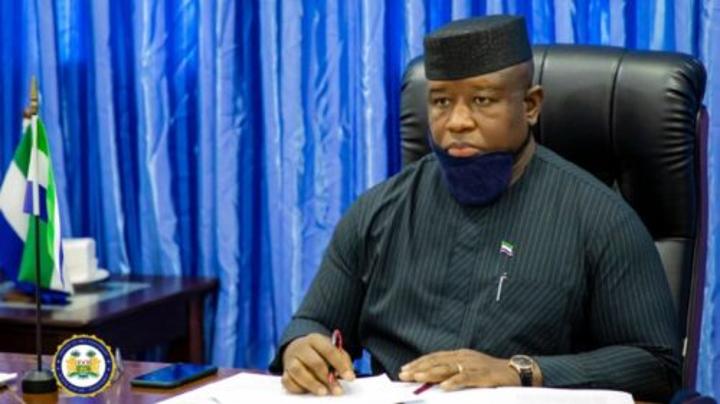Africa-Press – Sierra-Leone. In his article on the urgent need to disassemble the SLPP government’s economic governance structure and reconstitute it with committees composed of technocrats from an eclectic mix of talents – corporate, civil society and others, Mr. Suma is suggesting that his proposal is a panacea for redeeming the country from chronic poverty and economic deprivation because the current SLPP government is incapable of managing the economy due to incompetence, lack of capacity and foresight.
Mr. Suma further argues that the dire socio-economic situation he observed on his most recent visit to Sierra Leone is the worst the country has ever encountered, and it is due to poor capacity utilization, lack of candor, probity, policy drought and clarity, strategic leadership and therefore, the only way the economic wretchedness and misery can be reversed is through drastic and pragmatic change by appointing a coterie of committees from which a pivot committee should be formed to advice the president on economic policy in Sierra Leone.
I would like to push back against the claim that it is only by adding to the team of the de jure leaders’ stewards (President Maada Bio’s economic managers) with an eclectic committee members from all sectors of the economy that our country’s economic fortunes will change. But I agree with Mr. Suma that Sierra Leone’s economy is facing huge headwinds. The claim that it is due to lack of good policy and therefore need to add more bureaucracy to rescue the economy is normative and self-serving. I would also be interested in a further exposition of the incessant questions about the macroeconomy and the reasons for such questions when a simple Google search would have answered the questions.
When Mr. Suma suggests that the Sierra Leonean economy is not performing at an optimum level because of poor policy formulation and clarity, he is supporting his claim that the current leaders in government are not up to the job and therefore need help and support from the committee he is suggesting. This assertion cannot be further from the truth because even the 68.4 percent poverty rate data Mr. Suma quoted to support his claim of poverty in Sierra Leone was prepared by the then Minister of Economic Development and Planning, now Minister of Foreign Affairs and International Cooperation Mrs. Nabeela Tunis. The document specifically states that poverty rate in Sierra Leone in 2017 was 64.8 percent based on the Multidimensional Poverty Index (MPI), which inculcates political economy precepts instead of the normal income/expenditure index with neoclassical conceptions.
The SLPP government was not in government in 2017.They came into governance in 2018, and because of their seriousness of purpose decided to put together a formidable development planning document Known as the Medium-Term National Development Plan designed to map out a strategic plan for the economic development of the country from 2019-2023. It is from this plan that policies ranging from monetary policy to control inflation, fiscal policy to manage expenditure and revenue, education policy to develop the human resource of the country is drawn. Hence, to claim that the government lacks policy prescriptions to manage the economy towards creating improved economic activities for the Sierra Leonean people is not only hollow but farfetched and disingenuous at best.
Above all, the SLPP government was democratically elected in 2018 in a fierce and competitive election where political parties including the NGC political party presented their manifestos to the Sierra Leonean electorate, the bases on which the government in Freetown was elected to govern for the next five years.
Therefore, for a professed member of an opposition political party to explicitly suggest that because the economic situation in the country has not improved fast enough, the government should therefore, abdicate its responsibility and turn its mandate over to committees to run the economy in a public document is not only high-handed and presumptuous but impractical as well.
This is because political parties are self-interested institutions that compete for political power to not only govern in their nation’s interest but their party members’ interest as well. As a result, the government in Freetown is doing its best under very strenuous circumstances especially when one takes the hand it was dealt into consideration upon taking power in 2018 to govern in the best interest of the electorate.
What however makes Mr. Suma’s proposal more impractical is that it is being presented amid the most devastating global health crisis that is affecting every part of the planet unscathed from its negative effect as no country in this interconnected globalized economy has escaped the rath of the COVID-19 pandemic. International trade is notably at its lowest ebb, so is national economic activity around the world, more so in Sierra Leone. It is therefore disconcerting for Mr. Suma to call on the SLPP government during a raging global health pandemic that is destroying lives and livelihoods to literally cede governance to a committee.
Moreover, markets as neoclassical economists conceived them have literally ceased to exist due to the intensity of the pandemic, particularly in develop and middle-income economies who purchase the exports that power the Sierra Leonean economy. This is the time for governments to come to the rescue of their citizens with deficit spending until the pandemic is put under control, and the SLPP government to their credit have done well to manage the economy accordingly.
Furthermore, I would like to know why Mr. Suma did not take some time to be informed on the current macroeconomic indicators of the country before resorting to the incessant and relentless questions in his proposal about such indicators. A simple Google search on these economic indicators on Sierra Leone would have given him the answers, as presented below:
Monetary Policy
The Central Bank as Mr. Suma knows, controls monetary policy through control of money supply, with responsibility for keeping the value of the national currency stable; stabilize the exchange rate as well as honor the contract between the people and the government. I am therefore glad Mr. Suma suggested that the central bank needs autonomy from the central government as it is done in all modern economies around the world. The good news is that the Sierra Leone Central Bank has gained that autonomy under the current SLPP leadership. It is the reason why we did not see more currency injected into the economy during the 2020 Christmas Holidays as it has been done in the past thereby inflating the economy. In the past, the Central Bank was under government control and was directed to print money into the economy at the whim of the president. Monetary policy under the current government is managed by the professionals of the Monetary Policy Committee (MPC) chaired by the Governor and not the president.
Exchange Rate
The exchange rate as economists understand it is not rocket science. It is the price of the currency – in this case the Leone, relative to another currency – say the dollar. When a central bank prints currency in abundance, the basic law of supply and demand will be the operating force. The more supply we have of the currency, the lower the demand will be, and the price will go down or depreciate, which is why the Leone gets devalued. Therefore, if we have an independent Central Bank Governor as we now have in Sierra Leone, who understand the dynamic of increasing the money supply because it will be inflationary then the Leone will start to stabilize.
Relationship of Fiscal Policy to the Exchange Rate
Fiscal policy as conceived by economists, is conducted by taking into consideration a country’s national savings, that is, the country’s Gross Domestic Product (GDP), the total production of a country each year, and subtract total consumption, government spending, and the difference should be the national savings of the country. For a country to have a positive national savings, the country must have trade surplus, and that country will be able to lend its savings to the rest of the world as the Chinese and Japanese are doing.
On the contrary, if the country has negative national savings like we have in Sierra Leone, then it is obvious that we will have to borrow from the rest of the world. If we cannot borrow because we do not have the credibility to borrow because of past debts, then the country must be lucky to receive foreign aid or have foreign direct investment to bring in foreign currency to help stabilize the exchange rate. Also, if the country runs a huge trade deficit, and it cannot borrow and get foreign aid in the magnitude it needs to close the deficit, then its currency depreciates, and the country’s goods become cheaper, and they will sell more goods to earn foreign currency to stabilize the exchange rate.
This subsequently leads me to ask the question, what type of policy should government develop to control its expenditure and concurrently increase income and stabilize its currency? Economic theory postulate that two variables are significant in determination of the value of any currency, be it the Leone or the dollar. Gross Domestic Policy (GDP) and the money stock. The SLPP government as empirical evidence show, is working incessantly to control these two variables through policy prescription to put the Sierra Leonean economy on a long-term growth and sustainable path.
Moreover, the SLPP government through its restructuring programs at the Ministry of Finance, the National Revenue Authority, the Ministry of Education through the Free Quality Education Program towards Human Resource Development was on its way to stabilize the financial system and economic recovery save but the outbreak of COVID-19 pandemic an external shock that disrupted the plan.
Again, my analysis above also ties into the argument I have made that the macroeconomic situation in Sierra Leone is not as dismal as Mr. Suma claims. For example, according to the African Development Bank Group, (2019, report), real GDP was 3.94% in 2018 and is 3.54% at the end of 2019, a decline of 0.42%. Inflation was 16.9% in 2018, it is estimated at 15.6% in 2019, and projected to decline to 10.3% of GDP in 2020 and 9.7% in 2021. The current account deficit was 13.8% of GDP in 2018 and estimated to fall to 11.7% in 2019. The continued reduction of the deficit will also help improve the exchange rate as the Central.
It is therefore evident that even though the economic situation is not where we will currently want it to be, things are not as relatively bad as Mr. Suma is suggesting, as serious work is being done by the government and stakeholders through serious policy formulation to move these indicators forward and improve economic activity in the country.
Finally, while I understand and appreciate the great work as well as sacrifice Mr. Suma and other serious minded and right-thinking Sierra Leoneans have done and continue to put into the fight to redeem our country from the pernicious and dreadful injustice, poor governance and corruption that prevailed under the erstwhile APC government and some of which continue to exist under the current SLPP government, that sacrifice must not be compromised on the altar of ego and pomposity, as it does not give us the unwarranted authority to our own facts and theories about governance in Sierra Leone. We must continue to exercise patience, offer humble advice when necessary. We should wait for the 2023 general elections to hold them accountable – their stewardship or lack thereof.
Author: John Mannah, Maryland, United States






